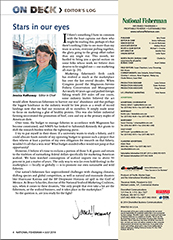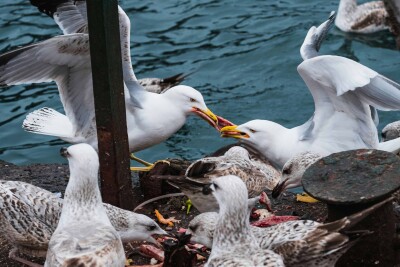Stars in our eyes
If there's something I have in common with the boat captains out there who might be reading this, perhaps it's that there's nothing I like to see more than my team in action, everyone pulling together, the glory going to the group effort rather than any single star. This month, we hustled to bring you a special section on some folks whose work we believe does deserve to be singled out — our marketing all-stars (p. 20).
 Marketing fishermen's fresh catch has evolved as much as the marketplace has over the last several decades. When Congress passed the Magnuson-Stevens Fishery Conservation and Management Act nearly 40 years ago and pushed foreign fishing vessels 200 miles off our coasts, some industry leaders believed the act would allow American fishermen to harvest our seas' abundance and that perhaps the biggest hindrance in the industry would be low prices as a result of record landings now that we had our resources all to ourselves. It simply made sense to focus on marketing a glut of healthy protein. This was also before industrial farming necessitated the promotion of beef, corn and soy as the primary staples of American diets.
Marketing fishermen's fresh catch has evolved as much as the marketplace has over the last several decades. When Congress passed the Magnuson-Stevens Fishery Conservation and Management Act nearly 40 years ago and pushed foreign fishing vessels 200 miles off our coasts, some industry leaders believed the act would allow American fishermen to harvest our seas' abundance and that perhaps the biggest hindrance in the industry would be low prices as a result of record landings now that we had our resources all to ourselves. It simply made sense to focus on marketing a glut of healthy protein. This was also before industrial farming necessitated the promotion of beef, corn and soy as the primary staples of American diets.
Over time, the budget to manage fisheries in accordance with Magnuson has become constrained, and NMFS has looked to Saltonstall-Kennedy Act grants to shift the research burden within the tightening purse.
I try to put myself in their shoes: If a university wants to study a fishery, and I could allocate funds outside of my operating budget to sponsor such a project that then relieves at least a portion of my own obligation for research on that fishery, wouldn't I call that a win-win? What budget-minded office would not jump at that opportunity?
However, I believe it's time to reclaim a portion of those S-K grants and return to the tradition of earmarking federal dollars specifically for marketing American seafood. We have watched consumption of seafood imports rise to above 90 percent in just a matter of years. The only way to win (or even hold footing) in the marketplace — locally or globally — is to promote our own sustainable and wild fisheries.
Our nation's fishermen face unprecedented challenges with changing climates, shifting species and global competition, as well as natural and manmade disasters like Hurricane Katrina and the BP Deepwater Horizon oil spill in the Gulf of Mexico. As Bruce Schactler, director of the National Seafood Marketing Coalition, says, when it comes to these disasters, "the only people that ever take a hit are the fishermen, or the seafood business, and it takes place in the marketplace."
So the question is, are you ready for the fight?







